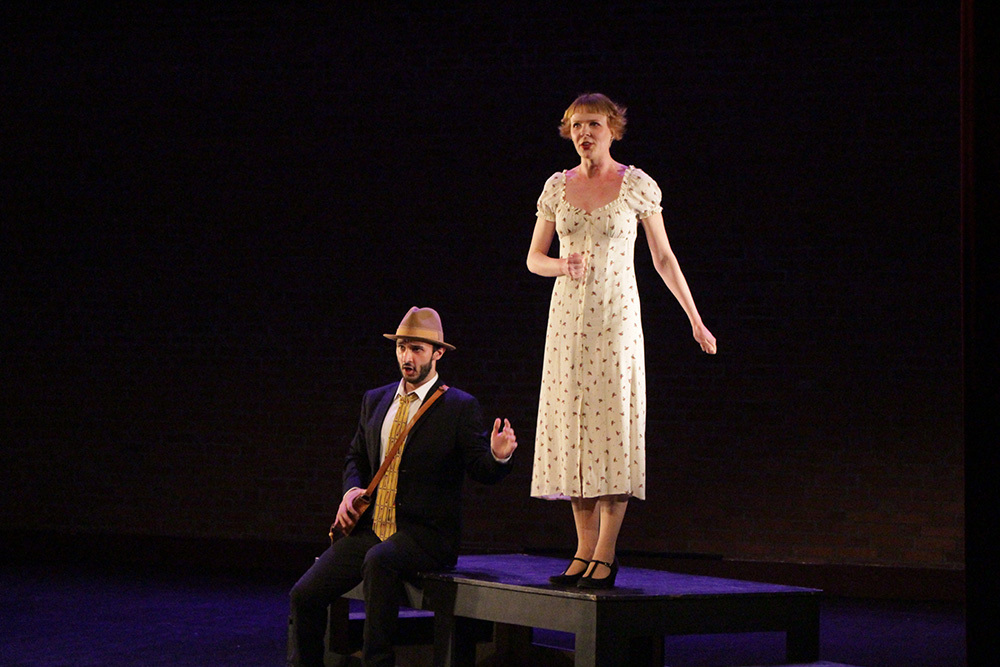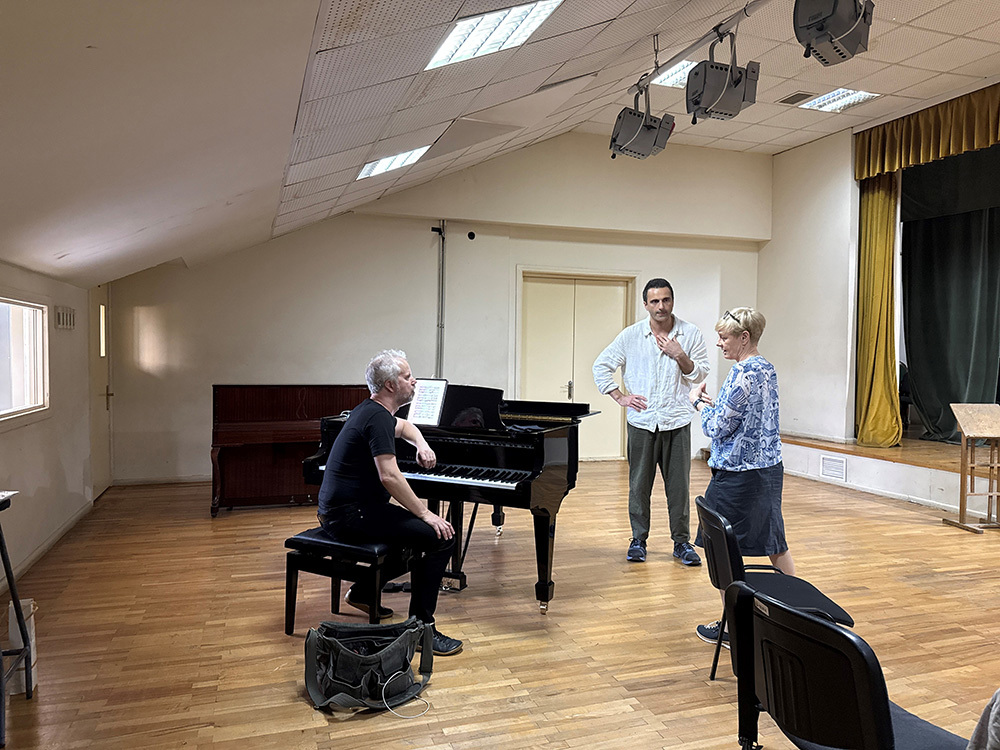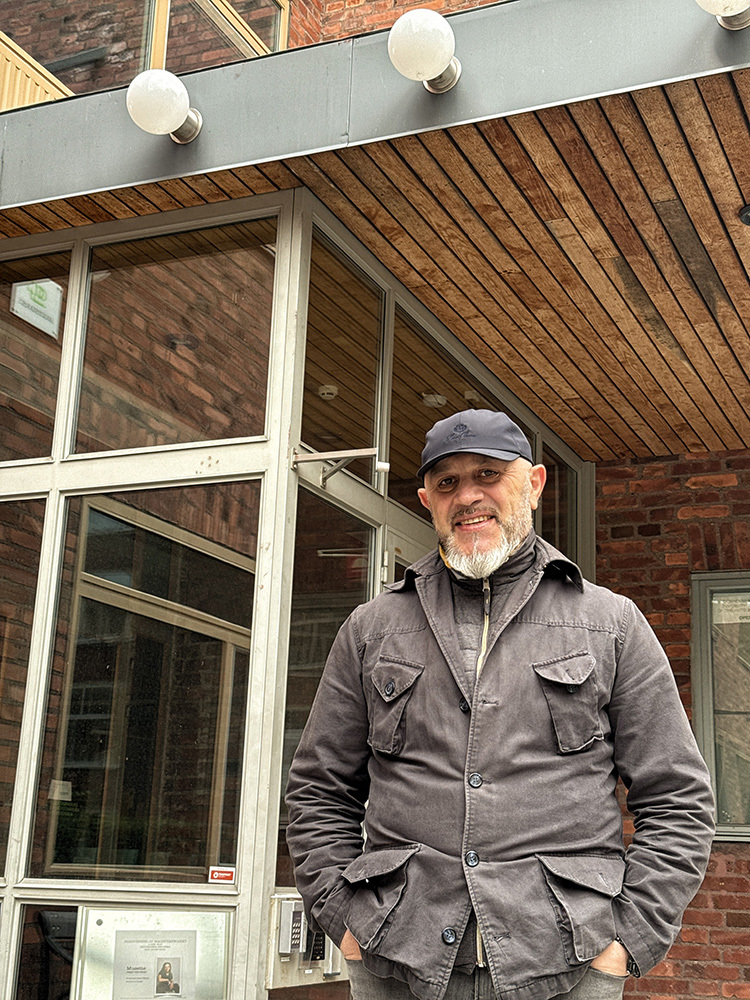Opera exchange with Georgia allows traditions to learn from each other
It began with casual contact and a pilot trip of a few weeks in 2013 to explore the possibilities for collaboration between the then University College of Opera and Tbilisi State Conservatoire, TSC. What no one knew at the time was that it would develop into one of SKH’s longest-running international collaborations – first through Sida's Linnaeus-Palme exchange programme, and then three three-year collaboration periods under the Erasmus+ banner.
One person who has been involved from the beginning is Martin Hellström, assistant professor of musical interpretation at SKH. He has travelled to Georgia many times and believes that the collaboration continues to be very rewarding for both schools.
“Georgia has a very strong singing tradition,” he says. “Not least, there is a singing tradition in folk music and religious music with choirs singing close harmonies, which provides a fantastic foundation for making the transition to opera. They have produced many international soloists who work on the big stages. Many young men sing and dance there, which is quite unusual here in the West, where many opera training programmes in Western Europe are experiencing a shortage of young male opera singers.”
In May, Martin travelled to Tbilisi on a teacher exchange programme together with Stina Ancker, professor of music dramatic performance. In contrast to Martin, this was Stina's first trip.
“It's an incredibly beautiful city, and you feel very welcome,” says Stina Ancker. “The students are curious and eager to take part in what we have to offer. But at the same time, you notice that the school has a completely different learning tradition – when we met the students, for example, I tried to start in my Northern European way by asking for their perspective. They replied, ‘No, no, please tell us how we are supposed to do things.’ But after a while, the conversation went well. I found the students to be very outspoken, and they asked many clever and critical questions.”
The gaze and the voice
The strong singing tradition in Georgia is fostered through an apprentice-master tradition, where each student often follows the same vocal teacher throughout their entire education. Successful singers, explains Martin Hellström, often see it as their duty to pass on their knowledge, and the relationship can become very close and provide a strong understanding of the qualities of the individual voice. There are also many more teacher-led voice training hours in Georgia.
At the same time, a successful opera singer must also be able to think for themselves in a stage performance – without an understanding of the content of a role, there is a risk that the expression will not be clear and have emotional impact. Here, SKH has a tradition of using methods that many students in Georgia feel they lack.
 Irakli-Luka Katsadze in The Elixir of Love by Donizetti, together with Lovisa Wahlund Ferm. Photo: Lise-Lotte Axelsson/SKH
Irakli-Luka Katsadze in The Elixir of Love by Donizetti, together with Lovisa Wahlund Ferm. Photo: Lise-Lotte Axelsson/SKH
“I have learned to think about my characters differently,” says student Irakli-Luka Katsadze. “You have to think about where you are looking when you sing a particular phrase – who am I actually addressing? It’s not a way I've thought about it before, and I think it gives the song more life, more character.”
Irakli-Luka Katsadze, who is a bass, spent three months in Stockholm on an exchange programme during the spring and summer. One thing he really appreciated during the exchange, he says, is how many performances and appearances he got to do. In Georgia, the education is highly structured around a dozen subjects that are studied in parallel, while the focus can shift during different semesters at SKH.
“During my three months here, I got to participate in three performances, one each month,” says Irakli-Luka. “It has really helped me – I used to have quite a lot of stage fright, I used to shake when I went on stage, but this has helped me become more confident.”
As part of the project, Gocha Datusani, bass and singing coach, also visited SKH in May this year and taught singing students in the opera subject area. During the visit, Gocha taught alongside SKH teachers – a way of exchanging experiences and providing a platform for further discussion. In May 2023, two teachers from Tbilisi visited SKH to discuss and learn more about how artistic research is conducted. Among other things, they attended Tove Dahlberg’s public defence and participated in study visits and meetings.
Turbulent times
There are clearly a number of distinct benefits that both schools gain from the exchange. At the same time, the recent period has also been marked by uncertainty about how the collaboration will continue. In October last year, a controversial parliamentary election was held in the country, which was won for the third time in a row by the EU-sceptical Georgian Dream party, and the mood there has affected all aspects of life in Tbilisi.
“You can see that Georgia is a very divided society, with strong opinions on both sides,” says Martin Hellström. “The management at the conservatoire was replaced even before the election victory, and some of the things we had planned to do had to be cancelled. We decided to reallocate funds to bring a guest student to Sweden instead.”
“It was very clear that people are feeling worried,” says Stina Ancker. “The students spoke quite openly about their fear that the country would become more closed.”
Despite the current situation – or perhaps precisely because of it – it feels important to continue to push for cooperation in these turbulent times. Both parties hope to continue collaborating on new projects. One idea that was supposed to be launched in the latest round but has been put on hold is for SKH to help support TSC in establishing a master’s degree in what is known as collaborative piano, which includes the role of opera repetiteur from an artistic perspective.
“I was over there last winter and sat on the jury for an examination in collaborative piano for young piano students,” says Martin Hellström. “The pianists are of an incredibly high standard! I also had direct contact with several people who work in this field, and I hope that we will be able to participate and exchange experiences in establishing their repetiteur programme, and to invite guest lecturers with roots in their strong piano tradition.”
SKH’s collaboration with Tbilisi State Conservatoire
The project has been running for three years and was completed this summer. It is supported by Erasmus+ and is a so-called International Credit Mobility (ICM) project, which is part of Erasmus and enables exchanges outside the EU. However, the contacts between the Opera programme at SKH and Tbilisi State Conservatoire (TSC) go back a long way and were previously made possible with the help of the now defunct Linnaeus-Palme programme and later with ICM.
The current project period has included six teacher exchanges and one student exchange. The focus has been on three areas:
-
educational exchange of experience on student-centred learning
-
exchange about an opera-coach master’s degree for pianists
-
artistic research
 Stina Ancker and Martin Hellström teaching on site in Tblisi. Photo: Martin Hellström/SKH
Stina Ancker and Martin Hellström teaching on site in Tblisi. Photo: Martin Hellström/SKH
 Gocha Datusani, Georgian vocal coach, visited SKH in May. Photo: Martin Hellström/SKH
Gocha Datusani, Georgian vocal coach, visited SKH in May. Photo: Martin Hellström/SKH